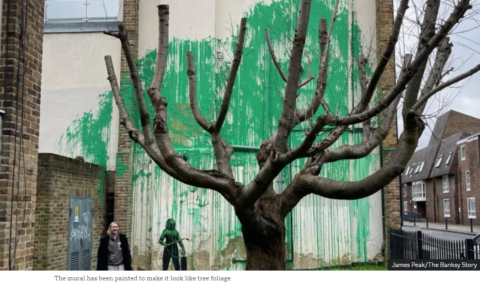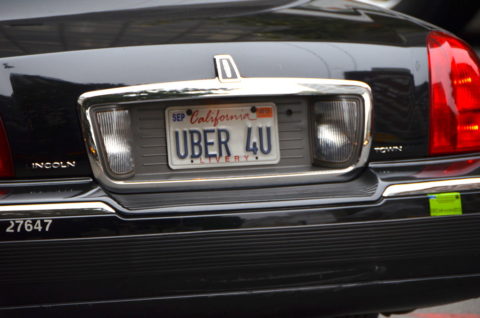As a certified curmudgeon, I’ve never seen the attraction of Banksy’s various bits of artistic … whatever it is properly called. At Spiked, Brendan O’Neill helps put Banksy into proper perspective:
I guess it wasn’t enough that us polluting plebs are chided for our transgressions against Mother Nature every time we watch a BBC nature documentary. And by politicians of all persuasions. And by columnists who summer in Tuscany. And by aristocratic arseholes called Edred and Poppy who won’t even let us enjoy the football or the snooker without cutting through the fun with their cut-glass tones to remind us we’re hazardous to Gaia. No, we also have to be walloped with an eco-sermon as we cycle to work down the Hornsey Road.
Unsurprisingly, the elites are lapping up Banksy’s latest missive in spray paint. A Radio 4 expert on Banksy – I’m dying – raved to the BBC that his message is “clear” and it “really resonates”: “Nature’s struggling and it is up to us to help it grow back.” The founder of Haringey Tree Protectors – I’m not making this up – gushed in the Guardian about how Banksy’s “stark image” reminds us that “in the climate crisis we just can’t continue treating our tree canopy with such savagery”. Pruning leaves is barbarism now. You just know that when green-fingered Charles III saw the Banksy pic during his morning peruse of the papers he gave it a kingly nod of approval.
That’s what Banksy is, isn’t it – a jester to the woke court, the cheeky clown of received opinion? He larps as rebellious, sneaking about in the dead of night to put up his technically illegal “art”, but in truth he has not once voiced an opinion that wouldn’t win noisy murmurs of approval at a soirée in Daunt Books. Brexit is bad, Israel is insane, the paparazzi are scum, don’t vote Tory, capitalism is a rat race, Save the Planet – honestly, browsing Banksy’s back catalogue of stencilled eyesores is like being stuck in a lift with one of those craft-beer centrists who says cockwomble a lot.
His Finsbury Park fake tree captures the conformist thinking that hides in his guerrilla-art performance. It’s a public-information campaign masquerading as graffiti. “Save the trees” – Rishi Sunak could say that. He has, in fact. He recently announced a ban on felling trees without “proper consultation”. Banksy’s tree also has that whiff of hysteria that always attends dinner-party efforts to alter the behaviour of the lower orders. The idea that we’re obliterating trees with “savagery” is bullshit. London’s a forest. Literally. The UN defines a forest as anywhere that is at least 20 per cent trees – London is 21 per cent trees. The “world’s largest urban forest”, as Time Out puts it.
So relax, Banksy. Chill in the no doubt cushy pad you bought from selling your graffiti to philistine luvvies. London’s fine. If anything were to make me leave this great city, it wouldn’t be a want of trees but the oversupply of your sixth-former propaganda. Only a few months ago he put up a “STOP” sign in Peckham decorated with three drones to signal his desire for a ceasefire in Gaza. Radical.
Look, it can be irritating when artists decide to épater la bourgeoisie. That slogan, dreamt up by the decadent poets of late 19th-century France, means to take glee in scandalising the middle classes. But surely Banksy’s style of pandering to the middle classes – let’s call it servir la bourgeoisie – is worse? He is simply smuggling the received wisdom of society’s self-styled betters under the cover of edgy graffiti. From his anti-Brexit mural showing a workman sadly chipping one of the yellow stars from the EU flag to his image of Brits pledging their allegiance to the flag of Tesco – consumerism is slavery, y’all – his every utterance is chattering class to the core.







